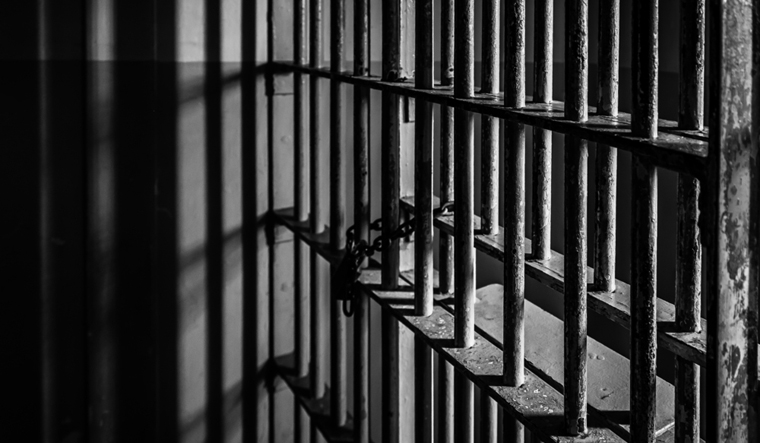Sandeep Goel, director general (prisons) in Delhi, told a high powered committee headed by Justice Hima Kohli that prisoners, staff and others working in prisons are taking necessary precautions and adhering to social distancing. He also informed the committee that the bathing area, kitchen area and jail telephone area are being cleaned and sanitised on a regular basis.
As the number of deaths due to coronavirus pandemic keep rising, jail authorities across the country are pulling up their socks to make sure enough measures are taken to keep the inmates away from the deadly virus. From screening new inmates, making available protective gear, and conducting daily medical examinations to putting up advisory posters, encouraging the inmates to maintain personal hygiene, jails across Maharashtra are also taking various steps to fight COVID-19 pandemic.
"We have made sure to not accept any accused or inmate at least as of now. It has been totally stopped," said Dhaberao, deputy jailer at Mumbai's Arthur Road jail which is situated barely 100 metres away from the Kasturba Gandhi Hospital, the present isolation and treatment centre for COVID-19 patients in Mumbai.
"All those who come to us are being directed to the Taloja jail to prevent overcrowding," said Dhaberao.
At the Yerawada Jail in Pune, every new prisoner first goes in a new barrack where he stays put for three days and from there to the second barrack where he is asked to stay for another 10-11 days. Twenty separate cells are allocated for inmates showing COVID-19 related symptoms, for the purposes of quarantine. Following a Supreme Court suggestion on March 23, states have started releasing inmates on bail for 30-60 days, sending them home for quarantine. Earlier, in the last week of March, Maharashtra Home Minister Anil Deshmukh directed the state to release as many as 11,000 convicted and undertrial prisoners.
However, a daughter's pleas for her sexagenarian mother's release from the Byculla jail in Mumbai during the pandemic has fallen on deaf ears. Professor Shoma Sen, head of the English literature department at Nagpur University and champion of women's rights has been in prison since June 6, 2018 when she was arrested with eight other intellectuals in relation with the Bhima Koregaon case. "The last time I met my mother was on February 29 and that too for 15 minutes only. All meetings at the jail have been cancelled in the wake of the nationwide lockdown due to the COVID-19 pandemic," said Koel Sen, Shoma Sen's daughter in a post on Amnesty International.
Even as the Maharashtra state home ministry notified the release of 11,000 inmates from prisons across the state for 45 days on emergency parole, those accused under the Unlawful Activities Prevention Act (UAPA)—nine Bhima Koregaon activists have been charged under this Act—cannot be allowed to get out of the prison. "They have been allowed to call their families from jail but only for two minutes, using only one mobile phone shared by three thousand prisoners. I have not even received that two minute phone call from my mother yet. This situation is quite frightening considering the coronavirus pandemic. My mother suffers from anxiety, hypertension, arthritis, glaucoma and low immunity," said Koel.
According to National Crime Records Bureau statistics for the year 2018, the prisons in India have an average occupancy rate of 117.6 per cent. Majority of the prison population (69.4 per cent ) are undertrials. Overcrowding in a confined space is a major health risk as it compromises hygiene and facilitates the spread of infectious diseases—and is a context in which COVID 19 could rapidly spread. Reports have already filtered in about rioting due to panic in some of the prisons.
"Jan Swasthya Abhiyaan acknowledges and appreciates the steps taken by the Supreme Court of India and certain states to prevent the spread of the disease in prisons. But much more urgent action is needed. To combat the spread of COVID-19, it is imperative, noted by the Supreme Court, to focus on decongestion of prisons as well as improving the living condition in prisons. There need to be clear and cogent guidelines for prisons across the country to tackle the pandemic," said Kamayani Bali Mahabal, health and human rights activist with Jan Swasthya Abhiyaan.
In a letter to the home ministry, National Human Rights Commission, state human rights commissions and to the Supreme Court, JSA made a few recommendations such as the release on bail of prisoners above 60 years of age, women prisoners with children below six years and those who have pre-existing health conditions keeping in mind their increased susceptibility to the virus, holding of court camps in every prison to ensure early release without exposure to external public spaces, medical checkup of every prisoner for relevant symptoms before the release, provision of transport facilities to all the released prisoners so as to ensure they have the means to reach their houses during the lockdown, and the setting up of a prison for a biweekly or weekly phone call to the family as is already being done in Tamil Nadu and Maharashtra, among others.
"Once the prisoners are allowed to go, there should be a facility that will transport them to their destination. But as happened at Arthur Road Jail, the prisoners were simply left waiting outside the jail not knowing what to do," said Mahabal.
"Prisoners should be immediately informed about the COVID-19 pandemic, how to prevent themselves getting the infection and the possible symptoms. and the health and hygiene systems must be improved to include more spaces for bathing and more mobile toilets, soap, sufficient water and sanitizer for each prisoner, among others," she added.



